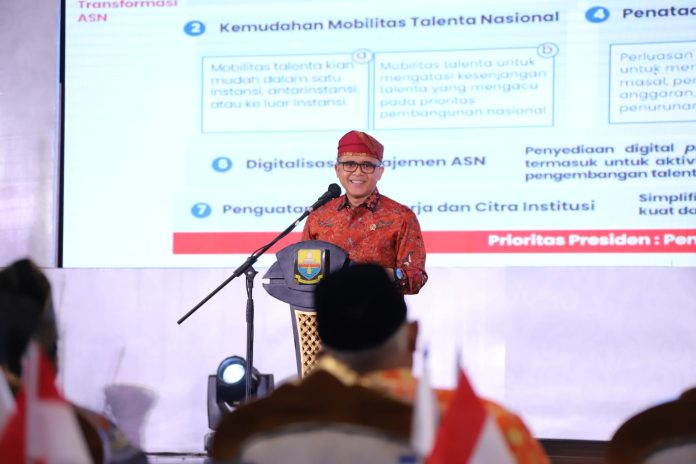JAMBI – As the representative of the central government, the governor has an important role in encouraging the acceleration of the implementation of various policies at the regional level.
The governor can be an accelerator of impactful bureaucratic reform, both in terms of ASN management, digital transformation, and public services in various district/city governments.
“President Joko Widodo has directed that bureaucratic reforms should have a direct impact on society and not just be a pile of paper. To realize this, the bureaucracy must be agile and fast,” said Minister of Administrative and Bureaucratic Reform Abdullah Azwar Anas at the National Working Meeting of the Association of Indonesian Provincial Governments (AIPG) in Jambi, Tuesday (7/11).
Said to be the engine for development, whether the bureaucratic engine is good or not will determine the extent to which development targets are achieved.
Hence, as an “engine”, the bureaucracy must always be in top condition, so that it can drive the vehicle towards the national development goals expected by the entire community.
The former Head of LKPP said that currently bureaucratic reform (BR) is divided into double tracks, namely General BR and Thematic BR.
Thematic BR focuses on poverty alleviation, inflation improvement, government digitalisation, and the president’s actual priorities.
Of course, governors who act as an extension of the central government or representatives of the central government in the regions must become accelerators in the implementation of BR so that it has an impact on accelerating poverty reduction and increasing investment as well as various development priorities in the provinces and districts/cities in their respective provinces.
At the meeting attended by governors or their representatives, Minister Anas also reminded the importance of the neutrality of the State Civil Apparatus (ASN) ahead of the general election.
ASN neutrality has been regulated in the legal basis in the form of Law Number 20/2023 on ASN, Government Regulation Number 11/2017, Government Regulation Number 42/2004 on the Development of the Spirit of Corps and Code of Ethics of Civil Servants, and Government Regulation Number 94/2021 on Civil Servant Discipline.
Based on the survey, the parties that most influence ASN in violating neutrality are the success team, ASN superiors, and election candidate pairs.
The causes of ASN’s partisanship in the elections are fraternal ties and ASN’s career interests.
Forms of political intervention against ASN range from intimidation, support for winning funds, entrustment of projects, requests for assistance in mass mobilisation, and vote mobilisation.
Therefore, he appealed to regional heads, in this case the governor, to maintain the neutrality of ASN.
Minister Anas also said that, in line with the dynamics of the strategic environment, digitalisation is one way to improve the bureaucracy through the implementation of the Electronic-Based Government System (EBGS).
The implementation of EBGS can provide convenience to the public to be able to access public services.
In addition, with good EBGS implementation, it will be able to increase the corruption perception index, ease of doing business, and law enforcement index.
“Strong digital leadership is the main driver of digital transformation success. In addition, the recruitment of digital talent (including from the private sector), focus on user needs (citizen centric), digital revolution in all lines, and synergy between digital strategy and data strategy are also key factors for the success of digital transformation,” he said.
At the same event, Jambi Governor Al Harris expressed his readiness to maintain the neutrality of ASN ahead of the general election.
Together with the AIPG, his party also committed to creating a safe, peaceful and conducive region.
In addition, this forum is also expected to be a learning process between regions, so that it can be applied in their respective regions.
“In the future, AIPG will not be only an association for provincial governments. But there are concrete works in order to improve regional competitiveness, build a better economy in the future,” he concluded.




